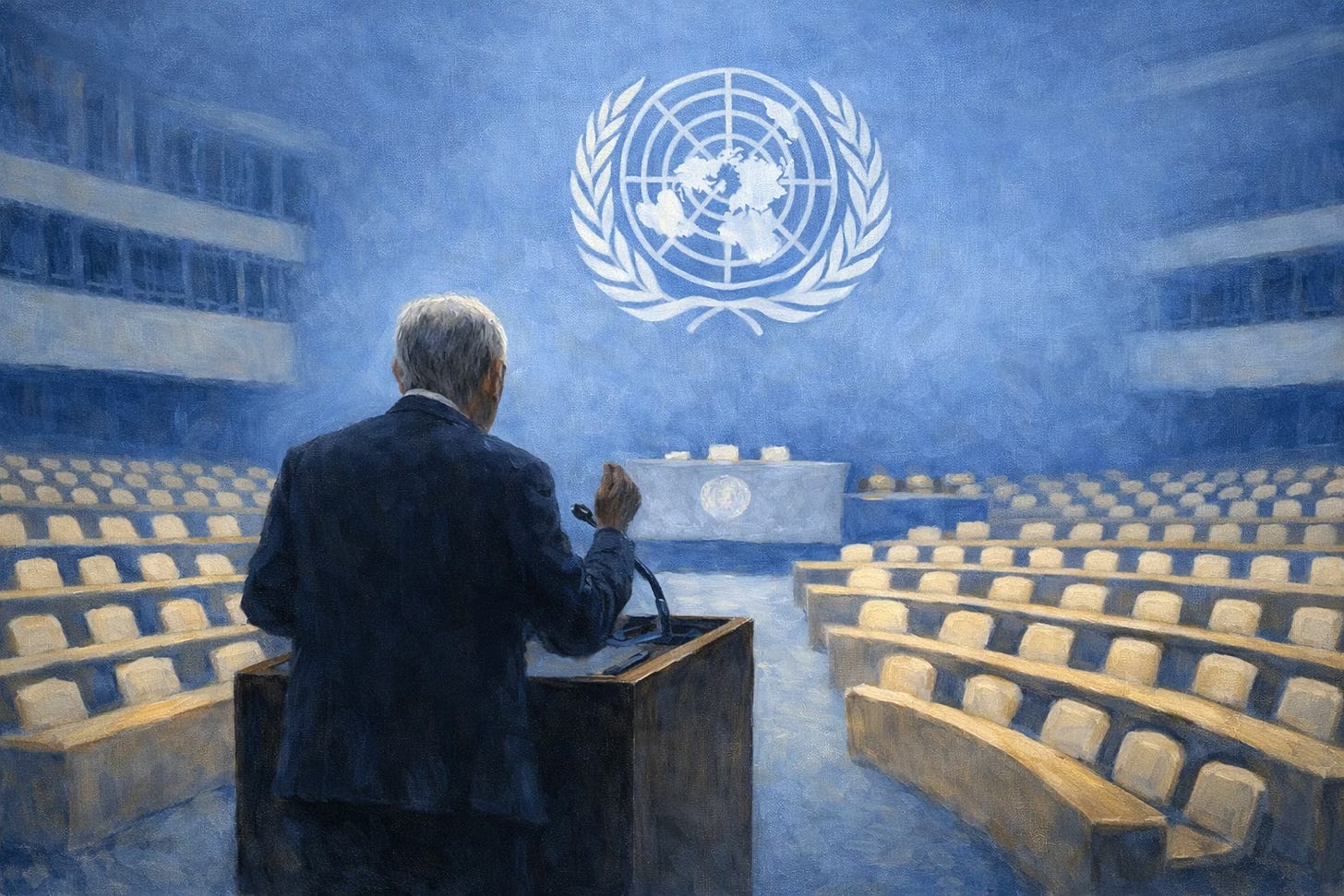An Empty Hall, A Broken Strategy
Netanyahu faces a world turning away as his coalition clings to conflict.
Benjamin Netanyahu, under an ICC arrest warrant, thundering at the UN General Assembly to a room that’s mostly chairs.
Delegations walk out.
Cameras sweep the empties. The silence is the verdict.
He vows to finish the job in Gaza, sneers that Western recognition of a Palestinian state is insane, treats famine declarations like PR smears. If that’s strategy, it’s kamikaze. If it’s survival, it’s political, not national.
Israel is isolated in a way we haven’t seen in years, including among friends. Dozens of diplomats exit as he approaches the podium.
Netanyahu isn’t talking to the world. He’s signaling to the partners who keep him in power, the hard-right bloc that trades coalition stability for maximalist demands. There’s no political endgame. No credible pathway for hostages. No off-ramp.
The war functions as a substitute for strategy and a shield against accountability for the failures that detonated in 2023.
For years, the Israeli right sold the Abraham Accords as proof normalization could bypass Palestinians. In 2025 the Accords look like a golden leash, and the hand on that leash belongs to Donald Trump.
He puts it plainly: no annexation. Enough. Time to stop. That’s legacy protection, not peacemaking.
Emmanuel Macron calls annexation a red line that would end the Accords. The UAE, a cornerstone of the Accords, says annexation is a red line, full stop. In 2020 normalization followed the shelving of earlier annexation plans. The Arab signatories can’t survive being seen as silent partners to a formal takeover of the West Bank.
Cross that line and the structure wobbles. Egypt. Jordan. The new Gulf ties. Years of careful architecture at risk.
Europe stops waiting for a US-mediated process that’s dead on arrival. The UK, France, Canada, Australia recognize Palestinian statehood in a coordinated burst tied to the UNGA. If Israel’s government races to make a two-state solution physically impossible, recognition tries to make it diplomatically irreversible.
Inverting Oslo’s logic, these governments treat statehood not as the prize at the end of talks but the precondition for talks worth having. You don’t negotiate for existence. You negotiate borders, security, final status — as peers.
This is also a direct answer to the E1 project and the loud talk of annexing as much as 82% of the West Bank. That blueprint aims to pour concrete on a Palestinian state.
Even reliable friends start saying the quiet part out loud. Greek Prime Minister Kyriakos Mitsotakis, not part of the recognition wave, says Israel’s right to self-defense does not justify the death of thousands of children and warns that staying this course will erode what support remains.
Netanyahu’s government isn’t managing complexity. It’s cornered by coalition math. The far right wants annexation. The rest of the world draws a line. Trump in 2025, eager to preserve his first-term signature, turns into the accidental enforcement arm of the Accords’ conditions.
The old patron–client routine worked when the costs were rhetorical. It crumbles when your patron’s legacy and the regional order are on the table.
What if he calls the bluff? Imagine a symbolic annexation rolled out to feed the coalition. Then the red-line crowd must choose between humiliation and consequence. Do they swallow it and torch their credibility, or start pulling wires: downgrades to the Accords, economic pain, diplomatic freezes — the kinds of steps Macron already floated as fair game.
The US-only peace architecture is over.
What replaces it is messy and multipolar: Netanyahu’s cabinet chained to a hard-right survival pact; a US administration treating the Abraham Accords as a crown jewel; a European-led bloc using recognition and sanctions talk as instruments; Arab Accords states balancing ties with Israel against legitimacy at home.
Facts on the ground and facts in law are being laid down at speed. Settlement expansion and E1 threaten contiguity. State recognitions try to lock in political legitimacy.
One of these will outrun the other.
If annexation jumps first, the Accords can snap and take the region’s brittle scaffold with them. If the recognition strategy reaches critical mass, Jerusalem faces a different isolation — not just moral but legal and transactional — with friends carrying the stick as well as the script.
Either way, the comfortable fiction of managing the conflict is dead.
This doesn’t end in a handshake photo. A government terrified of collapse has chosen escalation as policy. A world tired of being gamed has drawn a real red line. And the Abraham Accords, once the excuse to sideline the Palestinian question, have come back as a leash that tightens the harder Netanyahu pulls.
The question isn’t whether it snaps. It’s what else breaks when it does.


